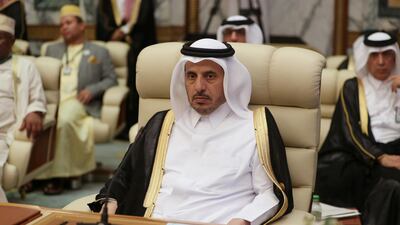Saudi Arabia has pulled off a gargantuan diplomatic feat by hosting dozens of countries with diverging views for three separate summits and hundreds of side meetings over two days with just a few weeks’ notice.
There are clearly deep and well know divisions in the region, from Iran’s actions (the focus of the meeting) to the Syrian war, that could have derailed the summits.
But, it was how the Gulf crisis would play out that was the main focus for many.
Doha sent Prime Minister Abdullah Al Thani to represent the peninsula nation, marking the highest-ranking official to attend a summit in Saudi Arabia since the kingdom cut ties in 2017. Saudi Arabia, UAE, Bahrain, and Egypt severed contact after accusing Qatar of support terrorist groups and interfering in internal affairs of other nations, which Doha denies.
Mr Al Thani’s attendance led some to speculate about a resolution to the two-year standoff. While there was no major announcement on relations and the official’s from Saudi and Qatar seemed frosty, the prime minister did shake hands with King Salman and they endorsed the meetings final communique on Friday.
The second point is of particular significance for Qatar given that the statement’s strong condemnation of Iranian threats did not lead them to abstain – as others did – despite Doha aligning itself more with Tehran since 2017.
As Mr Al Thani entered the summit where Saudi King Salman was standing to welcome dignitaries, the Qatari official stopped briefly to greet the host.
Later footage from the summit floor appeared to show Kuwait Emir Sheikh Sabah encouraging Mr Al Thani to speak with King Salman again. The Qatari official walked over to Sheikh Sabah and King Salman – who reached out a hand – and went to take it, hesitantly pulled back before very briefly shaking it and moving on.
No grand public rapprochement, but still a significant step.
Despite the Qatari delegation looking like they’d really rather be elsewhere, it’s a long way from previous international summits – even in Saudi. Both sides are highly sensitive to perceived slights and so have largely tried to avoid high-level contact beyond customary pleasantries that were unavoidable.
When King Salman represents Saudi Arabia at a meeting, Qatar sends a functionary. When Qatari Emir Sheikh Tamim represents Doha, Saudi too will send a lower level official.
While Sheikh Tamim did not attend himself, the official Qatari news agency report of the invitation still described Saudi as a brotherly nation. Some reports indicated the invitation was received “warmly”.
There is a long way to go towards mending relations and it remains unclear at this point if the Makkah summit will represent a turning point.
The US has long pushed for a resolution and has looked for ways that Qatar and Gulf states can find common ground for cooperation. While there’s no indication that Washington encouraged Doha to engage more in the meeting or to back Friday’s statement, America has a significant military base in Qatar and will likely want to see a Gulf region in agreement when it comes to Iran to ensure their own security.
While many people shared a video that appeared to show Mr Al Thani’s delegation walking out during the opening remarks by Jordan’s King Abdullah, there has been no official comment about the supposed incident or separate corroboration. It appears as if the clip may well have been spliced together from several shots.
The move would have been a serious about-face for Doha given that Qatar has tried to reach out to Amman in recent months to improve relations.
However, it wouldn’t mark the first time that Qatari officials have left mid-speech from an Arab League meeting. Qatari Emir Sheikh Tamim got up and walked out as the body’s secretary general, Ahmed Aboul Gheit, was speaking in Tunis in March. Doha gave no reason for the abrupt departure.


